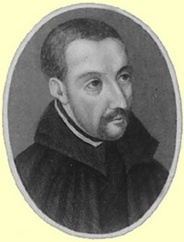 One of my favorite 16th century recusant poets is Saint Robert Southwell, an English Jesuit who preached the gospel in very trying circumstances. Southwell chose the obedience to be a Catholic priest in a country that outright persecuted Catholics and their priests. Ordained a Jesuit priest in 1584, his personal, theological and ministerial imagination, his human and divine calling, was to respond positively to a letter of the Superior General of the Society of Jesus of February 20, 1585 looking for missionaries to England. Southwell knew that his positive response to his religious superior would very likely end in martyrdom. Saint Robert Southwell’s poetry is challenging for the 21st century ear but worth the work of coming to understand his art and message. One such poem is “New Heaven, New War” expressing the Mystery of the Incarnation of God in history, the birth of Jesus.
One of my favorite 16th century recusant poets is Saint Robert Southwell, an English Jesuit who preached the gospel in very trying circumstances. Southwell chose the obedience to be a Catholic priest in a country that outright persecuted Catholics and their priests. Ordained a Jesuit priest in 1584, his personal, theological and ministerial imagination, his human and divine calling, was to respond positively to a letter of the Superior General of the Society of Jesus of February 20, 1585 looking for missionaries to England. Southwell knew that his positive response to his religious superior would very likely end in martyrdom. Saint Robert Southwell’s poetry is challenging for the 21st century ear but worth the work of coming to understand his art and message. One such poem is “New Heaven, New War” expressing the Mystery of the Incarnation of God in history, the birth of Jesus.
New Heaven, New War
Come to your heaven, you heavenly quires!
Earth hath the heaven of your desires;
Remove your dwelling to your God,
A stall is now His best abode;
Sith men their homage do deny.
Come, angels, all their faults supply.
His chilling cold doth heat require,
Come, seraphim, in lieu of fire;
This little ark no cover hath,
Let cherubs’ wings his body swathe;
Come, Raphael, this babe must eat,
Provide our little Toby meat.
Let Gabriel be now His groom,
That first took up His earthly room;
Let Michael stand in His defence,
Whom love hath link’d to feeble sense;
Let graces rock when He doth cry,
And angels sing this lullaby.
The same you saw in heavenly seat,
Is He that now sucks Mary’s teat;
Agnize your King a mortal wight,
His borrow’d weed lets not your sight;
Come, kiss the manger where He lies;
That is your bliss above the skies.
This little babe so few days old,
Is come to rifle Satan’s fold;
All hell doth at His presence quake,
Though He Himself for cold do shake;
For in this weak unarmèd wise
The gates of hell He will surprise.
With tears He fights and wins the field,
His naked breast stands for a shield,
His battering shot are babish cries,
His arrows, looks of weeping eyes,
His marital ensigns, cold and need,
And feeble flesh His warrior’s steed.
His camp is pitchèd in a stall,
His bulwark but a broken wall,
The crib His trench, hay-stalks His stakes,
Of shepherds He His muster makes;
And thus, as sure His foe to wound,
The angels’ trumps alarum sound.
My soul, with Christ join thou in fight;
Stick to the tents that He hath pight;
Within His crib is surest ward,
This little babe will be thy guard;
If thou wilt foil thy foes with joy,
Then flit not from this heavenly boy.
The Poetical Works of the Rev. Robert Southwell. William B. Turnbull, Esq., ed. (London: John Russell Smith, 1856). pp. 100-102.
